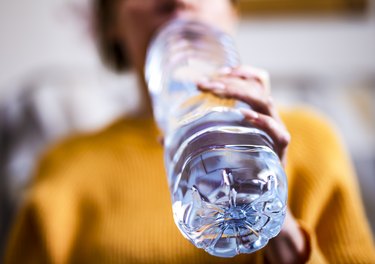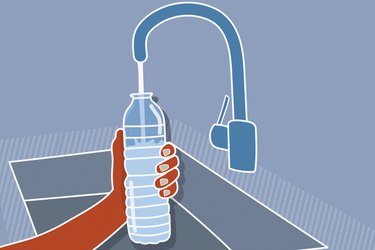
We've all heard of the dangers of leaving a bottle of water in a heated car for too long. Is there any truth to that sentiment?
There are many situations where you may need to store water for an extended period of time. Situations like packing for disaster relief or stockpiling water for the future both require you to know how to store your water safely (more on that below).
Video of the Day
Video of the Day
Here, a closer look at whether different types of water expire.
Types of Water
Tap Water
The Environment Protection Agency (EPA) sets standards and treatment requirements for the clean drinking water that we get from the tap, and oversees the states, local authorities and water supplies that enforce those standards, per the CDC.
In fact, these public drinking water systems provide safe drinking water to 90 percent of people in the U.S.
About 15 percent of people in the U.S. get their tap water from private wells, which isn't regulated by the federal government, according to the U.S. Department of the Interior.
Bottled Water
There are four different types of bottled water, according to the U.S. Food and Drug Administrations (FDA):
- Mineral water: Water that comes from an underground source and contains natural minerals and trace elements.
- Spring water: Water that comes from an underground formation and is collected at the spring or through a shaft in the ground.
- Well water: Water that comes from a hole in the ground, which taps into an aquifer (earth that holds groundwater).
- Artesian well water: Water that's collected from a well that taps an aquifer. The pressure in the aquifer (also called artesian pressure) pushes the water above the level of the aquifer, sometimes to the surface.
Rainwater
The CDC advises against drinking rainwater without treating it because it can contain germs and other contaminants. However, you could use this collected water for other resources, including bathing and watering plants, to help conserve water, per the CDC.
Does Bottled Water Expire?
This is a tricky one: Technically, the water itself doesn't expire, but it may be in your best interest to skip drinking from an old bottle.
"Water in the sense of itself does not expire; however, the material water is packaged in can break down and leak contaminants into the water itself," says dietitian Andrew Akhaphong, RD.
And dietitian Abigail Thomas, RD, agrees: "Water does not expire, but it is through the elements that surround the actual water itself that changes the chemicals in the water," she says. "It is not the water that expires but the container itself that holds the water that experiences degradation that ultimately has an impact on the water."
PET
Bottled water is sold in polyethylene terephthalate (PET), a clear, strong, lightweight and recyclable type of plastic that's denoted by a #1 on the bottom of the bottle, per Clean Water Action. Research suggests PET might act as an endocrine disruptor (aka, something that messes with your hormones), however, more human studies need to confirm these findings, per Clean Water Action.
While phthalates and other chemicals can leach into water from PET bottles — especially when exposed to high temperatures or stored for an extended period of time — a December 2019 study in the International Journal of Environmental Research and Public Health found their concentration was not high enough to pose a threat to people when stored properly.
What's more, water bottle plastic is a bit permeable, which may allow air gases to leech in and change the taste and smell of your water if stored near substances like paint thinners or household cleaners, according to the International Bottled Water Association.
BPA
Another thing to consider is taking in microplastics and their chemicals over time.
"An example is the use of bisphenol A (BPA) in the manufacturing of polycarbonate plastics," says Akhaphong. "BPA contamination in bottled water includes heating of the material or constant scratching and being rough with the bottle. BPAs are considered an endocrine-disrupting hormone."
Many manufacturers have removed BPA from their products for this reason. You'll see a #7 on a bottle if it may be made with a BPA-containing plastic, according to the FDA.
Tip
Because bottled water doesn't technically expire, the FDA does not require water brands to add an expiration date on their bottled water products. Still, many companies print an expiration date on their bottled water to ensure you're getting the freshest H2O possible.
Does Tap Water Expire?
Unlike commercially bottled water that you buy at the store, tap water from public drinking systems stored in containers should be replaced every 6 months, per the U.S. Department of Homeland Security.
"Tap water can be stored and for up to 6 months with minimal risk of adverse side effects as long as it has been stored properly," says dietitian Moushumi Mukherjee, RD.
How to Store Bottled Water Safely
To store commercially bottled water safely, do not remove or unseal the original containers. Keep it in a cool, dry place away from household chemicals if you're planning to keep it for long-term storage, according to the U.S. Department of Homeland Security.
That means you don't want to leave bottled water in your car in the summer or in a hot basement or garage where the plastic containers could degrade faster.

